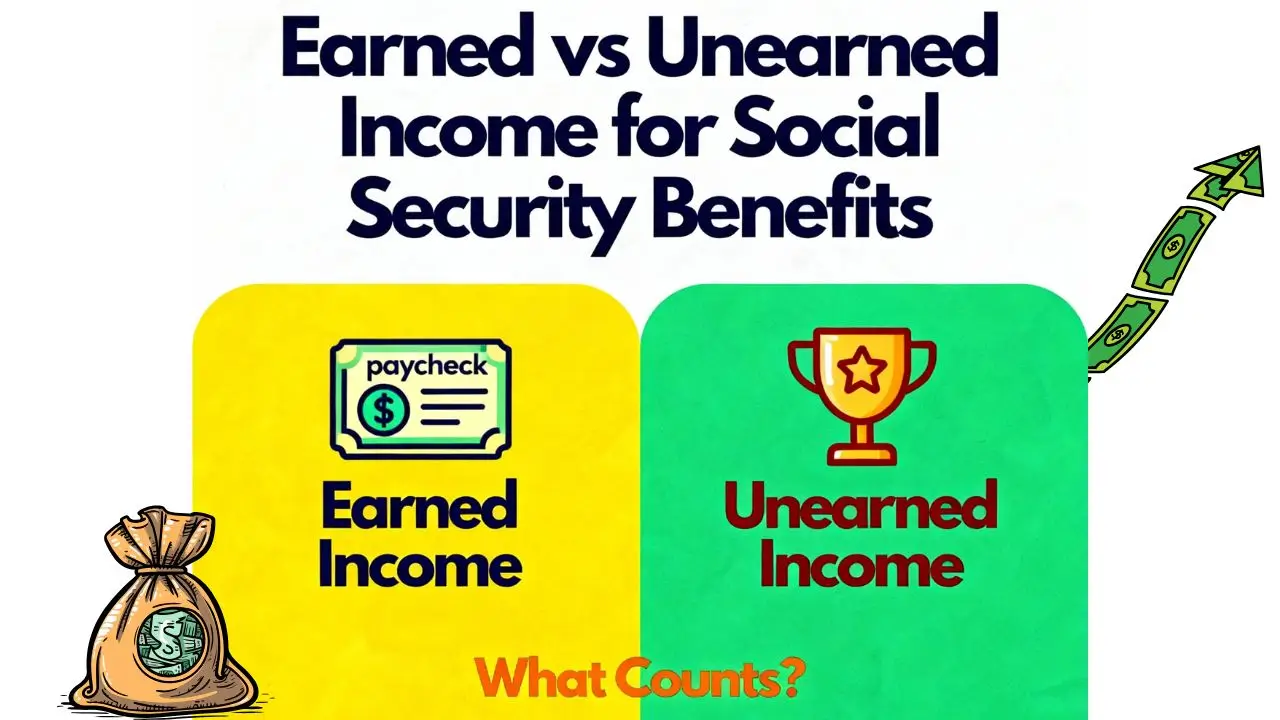When it comes to Social Security benefits, especially SSI (Supplemental Security Income) and SSDI (Social Security Disability Insurance), not all income is treated the same. The SSA separates income into two categories: earned and unearned. Knowing the difference—and how each program counts these categories—can help you avoid mistakes, maximize your benefits, and plan smarter if you’re working or receiving other types of support.
Understanding Earned and Unearned Income for SSI and SSDI
The simplest rule is this: earned income is money you receive for work you do, while unearned income comes from sources not tied to work activity. SSI counts both types but applies different exclusions, while SSDI mainly focuses on whether earned income crosses certain work-activity thresholds (like Substantial Gainful Activity). Passive or investment income generally doesn’t affect SSDI eligibility.
Earned vs. Unearned Income Rules
| Program | Earned Income | Unearned Income | Key Rules |
|---|---|---|---|
| SSI | Wages, self-employment net earnings, certain royalties/honoraria, sheltered workshop pay | Social Security benefits, pensions, unemployment, VA benefits, workers’ comp, interest, dividends, cash gifts, in-kind support | $20 general exclusion + $65 earned exclusion + 50% remainder counts; most unearned reduces benefits nearly dollar-for-dollar after $20 exclusion |
| SSDI | Wages, tips, bonuses, commissions, self-employment net earnings | Dividends, gifts, investments, pensions, interest (generally ignored) | Eligibility depends on work activity/earnings vs SGA; passive/unearned income doesn’t affect eligibility but earned income does |
| Exclusions | Student Earned Income Exclusion (SEIE), Impairment-Related Work Expenses (IRWE), Blind Work Expenses (BWE) | $20 general exclusion, certain third-party payments for non-food/shelter items may not count | In-kind support (food/shelter provided below market) treated as unearned and can reduce SSI |
SSI Definitions
SSI is needs-based, so it looks at both earned and unearned income. But the way income is counted is not one-to-one.
- Earned Income: Includes wages, self-employment net earnings, royalties/honoraria from your work, and sheltered workshop pay. SSI first applies a $20 general exclusion (which usually goes toward unearned income), then a $65 earned income exclusion, and finally counts only half of the remaining earnings. This means that working usually still leaves you with more total income compared to not working, since not all of your wages are counted.
- Unearned Income: Includes things like Social Security retirement/disability benefits, pensions, unemployment, VA benefits, workers’ compensation, interest, dividends, cash gifts, and most other non-work money. SSI generally reduces your check almost dollar-for-dollar after the $20 general exclusion is applied. In-kind support (like someone paying your rent or providing food) also counts as unearned income under SSI rules.
Key SSI Exclusions
Some special rules make working even more favorable under SSI:
- Student Earned Income Exclusion (SEIE): Lets students under 22 exclude a portion of earned income.
- Impairment-Related Work Expenses (IRWE): Deducts the cost of disability-related items/services needed for work.
- Blind Work Expenses (BWE): Allows blind individuals to deduct work-related expenses from income.
These exclusions can significantly reduce “countable income,” helping beneficiaries keep more of their SSI.
SSDI Focus
SSDI works differently. Since it’s insurance-based (based on your past work history), eligibility is determined by your ability to perform substantial work, not by financial need.
- Earned Income for SSDI: Includes wages, self-employment net income, tips, commissions, and bonuses. SSA uses these to decide whether your work crosses the Substantial Gainful Activity (SGA) level. If you earn above SGA, you may lose eligibility—unless you are in a Trial Work Period or other incentive period.
- Unearned Income for SSDI: Most non-work income—such as investments, interest, dividends, or gifts—does not count toward SSDI eligibility. This is a key difference from SSI. You can have significant passive income and still receive SSDI, as long as your earned income from work remains under SGA limits.
Common Examples
Here’s how the rules apply in everyday situations:
- Earned Income Examples: Hourly or salary wages, overtime, tips from service jobs, sales commissions, gig/contract work (like rideshare driving), bonuses, and net profits from running a small business.
- Unearned Income Examples: Social Security retirement or disability checks, unemployment benefits, VA benefits, pensions and annuities, workers’ compensation, alimony/child support, interest, dividends, trust fund distributions, and cash gifts from friends or family.
For SSI, almost all of these reduce benefits. For SSDI, most unearned income has no effect.
In-Kind Support and Maintenance
SSI also treats in-kind support and maintenance (ISM) as unearned income. This happens if someone provides you with food or shelter at below market cost, like letting you live rent-free or paying your grocery bill. SSA uses valuation rules to calculate how much this reduces your SSI check. But if someone pays for non-food/shelter items—like utilities, clothing, or medical bills—those usually do not count against your SSI.
Practical Guidance
To manage your benefits effectively, here are some simple strategies:
- For SSI:
- Remember that only about half of earned income counts after exclusions, so working often increases your overall income.
- Plan gifts and family support carefully—direct cash or payments for food/shelter may reduce SSI, while payments for other items usually do not.
- Use exclusions like IRWE or SEIE if you qualify.
- For SSDI:
- Focus on keeping earned income under the relevant SGA threshold if maintaining benefits is the goal.
- Passive or investment income typically does not affect SSDI, so you don’t have to worry about those sources.
- Always report work activity promptly, so SSA can apply Trial Work Period or Extended Period of Eligibility rules correctly.
Why Knowing the Difference Between Earned vs Unearned Income for Social Security Benefits Matters
Mixing up earned and unearned income is one of the most common mistakes beneficiaries make. For SSI, it can lead to reduced checks or overpayments that SSA later demands back. For SSDI, it can cause confusion about why your passive income doesn’t matter but your part-time job does.
By clearly understanding how SSA treats earned vs. unearned income—and keeping good records—you protect yourself from benefit loss, overpayment debts, and stressful misunderstandings with SSA.









No Comments Yet
Be the first to share your thoughts.
Leave a Comment